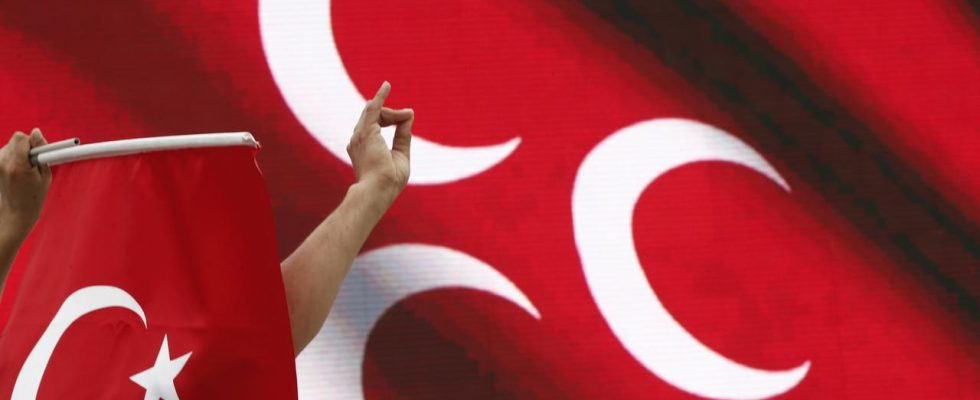German influencers with ties to Turkey spread nationalist content on Instagram and TikTok. They are aimed at a young target group – and trivialize the right-wing extremist Gray Wolves.
It is May 28, 2023, early summer. This Sunday evening, thousands of people are on the streets in Berlin, Essen, Cologne, Stuttgart and Hamburg. They are celebrating the re-election of Turkish head of state Recep Tayyip Erdogan. Among eligible voters in Germany, more than two thirds voted for Erdogan and his right-wing populist AKP party.
The head of state’s success is also celebrated by influencers on TikTok and Instagram. Weeks before the election, they prepare their followers for the election campaign and create a mood for Erdogan and his positions. The content is mostly in German and is intended to reach young Germans between the ages of 18 and 30 with a connection to Turkey. The dangerous thing: Disinformation, right-wing propaganda or right-wing extremist symbolism can often be found between supposed information videos.
Some influencers deny the oppression of minorities in Turkey. They spread propaganda or have Erdogan’s critics tagged under their posts. Dem ARDMedia magazine ZAP managed to talk to some of the influencers. There is no hostility towards Kurds or Alevis, says the influencer Yunus in an interview.
Trivialization of the Gray Wolves
Bilgili Üretmen is considered a pioneer of Turkish political influencers. He is known through YouTube and TikTok and sees himself as a mouthpiece for the Turkish community. The German-speaking blogger fills a gap: German-Turkish people often feel that they are not adequately represented in the media. And the reporting in German-language media is too one-sided for his AKP-affiliated community.
Üretmen also proudly presents himself in photos with the wolf salute, the symbol of the right-wing extremist Gray Wolves.
Who are the Gray Wolves?
The Gray Wolves are a right-wing extremist organization. According to the Office for the Protection of the Constitution, there are around 12,000 supporters of the fascist Ülkücü movement. They see the Turkish nation as ethnically and culturally superior and dream of a Greater Turkish Empire of Turan. They use three crescents as symbols. Your enemy image: Armenians, opposition members, Kurds, Alevis, left-wing Turks.
Vulnerable to Turkish nationalism
The political scientist Ismail Küpeli researches Turkey propaganda on social media. The influencers are concerned with making right-wing perspectives popular among German Turks, says the extremism researcher. Küpeli observes an increase in German-language propaganda with a connection to Turkey on social media: “German-Turks have the impression that they don’t appear in the traditional media. At least not as a person with their own voice. And with influencers they get a supposedly authentic voice the community itself.”
Many young people with ties to Turkey are susceptible to right-wing content because German politics always makes them feel alien. Küpeli also observes a greater willingness for the positions of the Ülkücü movement among AKP voters: “We are talking about racism, nationalism, anti-queer sentiment and other ideologies that are anti-democratic.”
Death threats from the Gray Wolves environment
Many of Erdogan’s critics are also in the crosshairs in Germany. Gökay Akbulut, is a member of the Bundestag for the Die Linke party and, as she reports, she repeatedly receives death threats on social media. She receives threats like this: “I saw you on the market square. You were alone. You should be careful. We will shoot you. Don’t think you are safe in Germany.”
The left-wing politician is calling for a ban on gray wolves in Germany. The responsible Ministry of the Interior would like to ZAP-Do not comment on this request.
France banned the far-right movement in 2020. In Austria, only showing the wolf salute is punishable.
Trivialization of the Gray Wolves
Influencer Üretmen, who presents himself with the wolf salute and whose content is publicly accessible to young people, apparently does not see himself as responsible for distancing himself from the Gray Wolves: “You are the ones who associate the whole thing with right-wing radicalism. I I think it’s a good thing when children or young people with a Turkish background are aware of their culture because they are never recognized as German.”
The German political influencer trivializes the right-wing extremist Gray Wolves. There is potential for radicalization for young Germans with ties to Turkey who feel excluded from German politics and overlooked by the media. They can find refuge with influencers.

